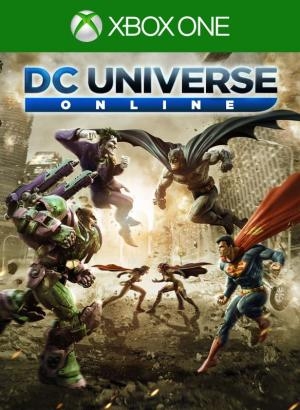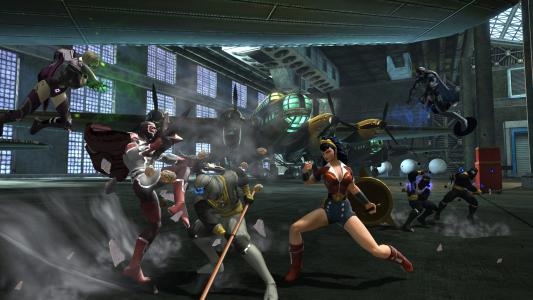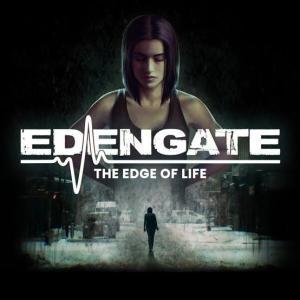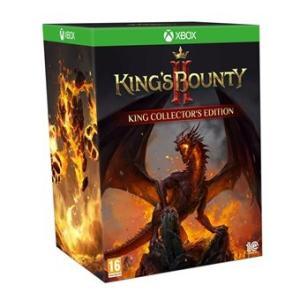
| Console: | Microsoft Xbox One |
| TV Standard: | Region Not Set |
| Developer(s): | SOE Austin |
| Publisher(s): | Sony |
| Release Date: | 2011-01-11 |
| Co-op: | No |
| Type: | Action, Role-Playing, MMO |

Brainiac and his robotic minions are invading Earth, and a final war between superheroes and villains have left humanity defenseless. In desperation, Lex Luthor travels back in time to warn his foes, and at the same time, litter the planet with the seeds to create new heroes. As one of these newly-transformed superhumans, players will choose to save the planet from Brainiac for the good of humanity, or to their own nefarious ends.
As an action MMO in the DC Universe, DC Universe Online will pit players with or against each other under the watchful eyes of major comic characters. Upon starting a character, players can choose to be a hero or a villain, with the tone and specifics of their missions changing accordingly. Next, they choose a mentor - Superman, Batman, or Wonder Woman for heroes, and Lex Luthor, The Joker, or Circe for villains. Though players will take missions from many different DC characters, this mentor will guide their overall progress to the level cap.
Character customization is then based on appearance, and a few specific archetypes matching up to traditional MMO roles. Nature and Sorcery powers evolve into Healer roles. Gadgets and Mental powers evolve into Control roles. Fire and Ice powers evolve into Tank roles. Each power has two trees which change the final role slightly, and the player only earns enough skills points to fill one tree, or a combination of both. All roles also have the ability to perform a DPS damage role, with powers shifting their effects accordingly. Players can switch between the two roles on the fly, with customized power setups for each.
DC Universe does not rely on traditional "auto-attack" MMO combat, and instead uses a system most analogous to a third person action game. Players can specialize in a number of weapon styles, each having a melee and ranged attack. Weapons are generally more effective at one attack than the other (i.e. guns for ranged, swords for melee). As the player earns skill points for progressing through XP levels, they can spend these points on combos for their different weapons styles, which give stronger attacks or debuffed states. Additional physics effects allow players to pick up objects in the world and throw them as weapons. The result is that the player is actively engaged in basic combat, and not simply firing off powers.
Gotham City and Metropolis are the two major locations, with the Justice League Watchtower (for heroes) and the Hall of Doom (for villains) acting as safe social zones. Both cities have recognizable locations from the comics, and a variety of hidden collectibles to reward exploration. Players can pick from super-speed, flight, or acrobatics to scale buildings and travel around the cities. A wide variety of other notable locations are recreated as PvP arenas, PvE "Alerts", or end-game Raids. These include Arkham Asylum, the Daily Planet, the Batcave, and even Area 51.
DC Universe has both PvE and PvP servers. Players can always be attacked by members of the opposite faction on PvP servers, even at lower levels. Most PvP takes place in Arenas, where players are dropped into maps with a specific goal (such as capturing and holding zones for longer than the opposing team). Standard arenas require players to use their own characters. Legend Arenas require players to use a familiar DC character, with a preset group of powers (so that everyone is on roughly equal footing). Characters for Legends are unlocked by completing collection quests inside the two cities.
Quests are the strong focus of DC Universe Online, and districts of the city are set up almost exclusively to support sets of missions. Quest lines usually last for 4-5 missions each, and send the player throughout that district and into an instanced boss lair for the end. Upon defeating the boss, players are rewarded with a "Headline" cinematic drawn by DC artists. Alongside the quests, players can also take collect and "beat up" missions from questgivers within the district for smaller rewards. Players can also spot random events within the city and intercede - so villains can notice a poor civilian to mug, or heroes can save citizens trapped under debris.
Armor and weapons with unique looks drop from enemies or are rewarded by quests, and once an item has been worn its "style" will be added to a character's style pane. By selecting and locking styles players can change the look of their character's armor or weapon, regardless of what the item they're actually equipped with looks like.
Both versions of the game support text and voice chat. Players can plug a USB headset or keyboard into the PS3 and use them within the game. Likewise, most gamepads can be plugged into the PC and used to control the game. Though cross-platform integration was planned, PC and PS3 players play on completely separate servers.
While originally a monthly subscription game, DCUO became free to play on November 2nd, 2011. At the lowest access level, Free, a player can have 2 characters, carry a maximum of 1500 currency, have no ability to trade or sell on the auction house, but unrestricted access to all non-DLC content. After spending at least $5 on the game the player's account is permanently upgraded to Premium, which comes with additional character slots, unrestricted voice chat, and limited trade and auction house access. The highest access level, Legendary, still requires a monthly subscription, but includes additional character and auction house slots, unlimited currency access, and free access to all DLC content packs. The real-money-transaction store contains mainly cosmetic items, such as non-combat pets or unique or specially colored styles, but players can also purchase additional character slots or instant access to the Ambush Bug's Loot Vault.
![Mortal Kombat 11 Ultimate [The 30th Anniversary Ultimate Bundle]](https://gm.egamedb.com/mortal-kombat-11-ultimate-the-30th-anniversary-ultimate-bundle-microsoft-xbox-one-fct.jpg)

![Knight Witch [Edizione Deluxe]](https://gm.egamedb.com/knight-witch-edizione-deluxe-microsoft-xbox-one-fct.jpg)
![TIEBREAK [Ace Edition]](https://gm.egamedb.com/tiebreak-ace-edition-microsoft-xbox-one-fct.jpg)

![MX Vs ATV Super ReCross Encore [2017 Official Track Edition]](https://gm.egamedb.com/mx-vs-atv-super-recross-encore-2017-official-track-edition-microsoft-xbox-one-fct.jpg)



![Just Cause 4 [Day One Edition Steelbook]](https://gm.egamedb.com/just-cause-4-day-one-edition-steelbook-microsoft-xbox-one-fct.jpg)